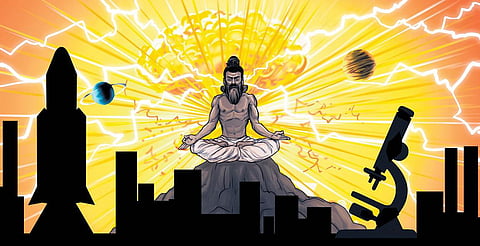

Science fiction is the most important literature in the history of the world because it is the history of ideas, the history of our civilisation birthing itself. Anything you dream is fiction, and anything you accomplish is science; the whole history of mankind is nothing but science fiction, which is central to everything we have ever done, said the famous American author, Ray Bradbury. If we observe the past two centuries, one can see the rise of modern science is intricately linked to the rise of science fiction in the west. It is no coincidence that a wave of science fiction that dreamed wildly about the future preceded the giant strides that Europe and America took to their age of prosperity and progress. In Japan, the wave of science fiction started in the eighties. The Chinese are now making waves not just in science, but in science fiction too.
The miracles of science we are enjoying today were once the fantasy of a sci-fi writer. What was once laughed at has become mundane and routine now. The scientist and the storyteller complement each other. We are the stories we tell ourselves. What we feed our children’s mind with would define how our future would shape. Unfortunately, Indians are stuck in the past. It may sound ironical, coming from someone who is making a living by writing mythological fiction in different mediums like books, TVs and films. To be fair to me, I have tried to take a rational approach to our Puranas, at least in my novels.
It is another matter with TV and films, which are totally market-driven. We are a civilisation having a history of many thousand years, and there is nothing wrong in having some historical and mythological fiction. Some pride in past achievements, real and fictional, is also acceptable. There is no tax for feeling proud about the past, so it can be a harmless pastime. The problem is when it becomes an obsession.
When did an Indian sci-fi film or TV show get the production budget of a Bahubali or a Padmavat? Even when the rare attempts were made, they became an excuse to show superstar antics. Perhaps, Indian films have been feeding Indians with stunts that defy all rules of physics and logic for so long, that they have ceased to believe in science. See the bestseller charts for books in India, and we find it also is dominated by mythological fiction, a genre only found in India.
With seven best-selling books in this genre in two languages, I should be the last person complaining about this fad, but the absence of sci-fi in our storytelling space is worrying. While discussing this issue, the chief editor of a major publishing house said that, in India, mythological fiction is science fiction. Compare this with the number of high-budget movies based on science that Hollywood produces or the sci-fi books that scorch the bestseller charts.
The propensity of the youth to think mythology is science—a claim that would have shocked the rishis and poets who wrote these beautiful tales—is a cause of worry. A generation of Indians is growing up believing that Lord Shiva did plastic surgery to fix Ganesha’s elephant head or in Mahabharata war, the warring parties who fought in horse-driven chariots hurled atomic missiles at each other. The poetic beauty, symbolism, and the depth of thought of these beautiful stories are given a miss, and such whimsical re-imagination is touted around with foolish pride. We are getting more and more sucked into the quagmire of our imagined past. Weighed down by the burden of the inferiority complex for being left behind in the scientific revolution, we are becoming comfortable in believing we discovered everything in modern science and foreigners stole them from our scriptures.
We need storytellers who would sell the dream of the future to the youth. We need ingenious minds to fire up the imagination of a child in rural India to dream about doing interstellar travel, exploring Mars, travelling to planets of Andromeda Galaxy or mining asteroids. We need superstar scientists like Neil deGrasse Tyson or Carl Sagan, who could inspire kids by popularising science and astrophysics. We are stories that we tell ourselves and the past, however glorious or gory it may be, cannot be our future.
mail@asura.co.in Author of Asura, Ajaya series, Vanara and Bahubali trilogy